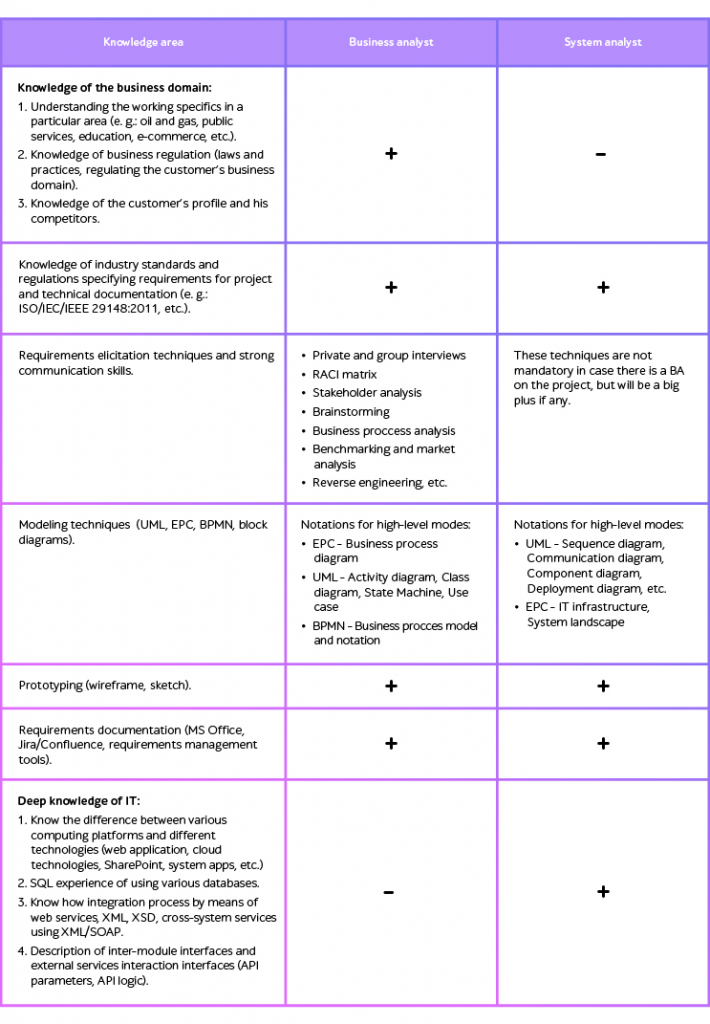
Difference between business analyst and system analyst
By Anton Trizna, Head of the a1qa Business Analysis TCOE, and Elena Goropeka, senior business analyst at a1qa.
The terms “business analyst” and “system analyst” are regularly misunderstood and used interchangeably. But in fact, these are two different positions with different duties and set of skills. We’ve decided to learn how these two positions differ and what commonalities they share in what relates to QA consulting specifics.
First, let’s take a look at the commonly applied definitions.

BABOK (Business Analysis Body of Knowledge, a table book for business analysts) says that there are many job titles that may perform business analysis: business architect, data analyst, business consultant, process analyst, requirements engineer and system analyst, etc.
BABOK also outlines that the business analyst should ensure that the delivered solution will enable the company to produce the expected outcome. And the solution doesn’t need to be an IT-system. From this perspective, we can assume that the business analyst is a general role applicable to the group of professions working with business requirements to ensure the achievement of the set goal.
Very often analytical roles in IT are divided according to the main sphere of the knowledge area: whether it’s IT specifics or customer’s business domain.
Where does the analyst fit in?

At a1qa, we have adopted the following differentiation:
- The business analyst will use business analysis methodologies to gather the customer’s requirements and check them for possible challenges to produce a high-quality solution.
- The business analyst in IT is the analyst who will solve customer’s problems by proposing to develop and implement certain IT-systems.
- The system analyst is responsible for defining technical aspects of the developed IT system, the platform, integration means, and developed system role among the company’s products.
Business analyst’s main focus is to identify customer’s needs and justify the necessity of the project implementation. Typical tasks performed by business analysts include:
- Discovering customer’s needs and problems.
- Designing of the project scope.
- Functional and non-functional requirements elicitation.
In the last stage, a system analyst may already come into play. However, the performed duties will vary. A BA won’t consider the implementation platform and technologies and will pay much attention to the customer’s objectives and preferences. At that rate, the gathered requirements should be measurable, clear and correct. An SA will choose the most appropriate technology and platform to meet all functional requirements.
At times, the platform and technology may be specified in advance. If so, the primary goal is to correlate functional requirements with the chosen software means, adapt them in accordance with the platform terminology and interaction interfaces to ensure proper developers’ work.
After addressing all the requirements, analysts start consulting development and testing teams. A BA will present the requirements from end-user’s perspective, while an SA will put emphasis on the platform.
Highly professional business and system analysts will possess the following knowledge and skills:

Following the division of the areas of responsibilities, business and system analysts will deliver different sets of documentation. A BA will create the vision and scope document, widely accepted business requirements document and software requirements specifications.
An SA will present the concept of IT solution and indicate the platform on which the system is to be developed, technologies, programming language and interaction interfaces.
Summing it up, in practice, it may be hard to differentiate between both roles as they may intercross on the project.
The titles themselves don’t matter a lot. What is really important is that all employees should be aware of the duties both specialists perform and what problems they are expected to solve.








